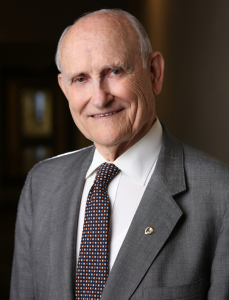Overview
Paul Cadenhead is renowned for his success in many areas of litigation. He is known as an outstanding trial lawyer. His personal philosophy is that a properly informed trial lawyer can successfully try a case involving any subject matter. This has afforded him the opportunity to be involved in many interesting matters, such as the 1958 assignment where Mr. Cadenhead was asked by the Atlanta Bar Association to assume the task of investigating and prosecuting a number of state officials for crimes committed in office. The two years in that assignment resulted in numerous pleas of guilty and convictions of these officials.
Mr. Cadenhead’s practice in insurance defense spans years. He has settled and tried many catastrophic cases involving multi-death collisions, quadriplegics, hemiplegics and other serious cases. He has handled cases of plant and building destruction from collapse and/or explosion and cargo crane failure resulting in substantial damage.
Mr. Cadenhead’s peers consider him a “lawyer’s lawyer,” since he has, at the request of their malpractice insurers, defended many lawyers in legal malpractice cases. In that regard, he has never had a jury verdict returned against a lawyer whose case he has tried.
Mr. Cadenhead’s abilities have been acknowledged throughout his career. He was included in all three separate editions of The Best Lawyers In America (Seaview/Putnam Publications), The Best Lawyers In Town (Atlanta) and Finding A Good Divorce Lawyer (Cosmopolitan). As an author, Mr. Cadenhead has written numerous professional articles, and has been quoted in Tax and The Family Law Practitioner (Calendar Call) and Breaking Up Is Hard To Do (Georgia Trend).
Mr. Cadenhead’s colleagues have elected him to office in practically every legal organization in Atlanta. He has served on the Board of Governors of the State Bar of Georgia, as President of the Atlanta Bar Association, as President of the Federal Defender Program, as President of the Atlanta Legal Aid Society, and as President of Atlanta Estate Planning Council and as President of the Old War Horse Lawyers Club. He is a fellow in the American College of Trial Lawyers, a fellow in the International Society of Barristers and a fellow in The American Academy of Matrimonial Lawyers, to name a few. He also served as Master in the Inns of Court program, a mentoring program for young trial lawyers. At one time it was stated that Mr. Cadenhead had conducted more Continuing Legal Education Seminars than any single lawyer in the state, two of such seminars being weeklong cruises sponsored by Georgia State University College of Law.
Mr. Cadenhead is also involved in the community, supporting numerous cultural, educational and charitable organizations. He has served as a trustee of Queens College, as President of the Georgia Association of Mental Health, as Vice Chairman of the Georgia Conservancy and as a member of the Atlanta Arts Alliance and the Georgian Club. He served on the Board of Sandy Springs Historical Foundation and Executive Committee of Atlanta Civil War Round Table.
Three universities have honored him. He received the Distinguished Service Award from University of West Georgia Alumni Association, The National Alumni Association’s Thelma Harman Turner Loyalty Award, Founders Award (its highest award) from University of West Georgia Foundation. In 2012 The University of West Georgia granted him an honorary doctorate degree (DHL), and in 2013 the State Board of Regents Foundation granted him its Alumni Hall of Fame Award. Emory University selected him as an Outstanding Alumnus, and Georgia State College of Law awarded him its Ben F. Johnson Public Service Award.
Mr. Cadenhead was the first lawyer in Atlanta’s history to receive all three of Atlanta Bar Association’s top three awards: The Charles A. Watkins, Jr. Award for Distinguished and Sustained Service to the Profession, The Leadership Award, and The Professionalism Award.
Mr. Cadenhead graduated from West Georgia College (now University of West Georgia) in 1944. After serving as a paratrooper in World War II, he attended Emory University Law School, graduating near the top of his class in 1949.

